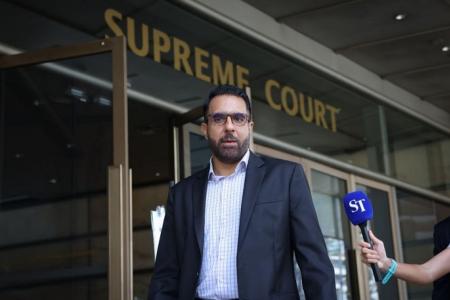Pritam Singh fails in bid to transfer case to High Court
Opposition leader and Workers’ Party (WP) chief Pritam Singh has failed in his attempt to have his upcoming trial heard in the High Court, after he sought to compare his case to that of former transport minister S. Iswaran.
On Sept 9, Justice Hoo Sheau Peng dismissed Singh’s application for his case to be transferred to the High Court, saying that he has failed to establish that the transfer of his case is expedient for the ends of justice.
Singh, 48, faces two charges of lying to a parliamentary committee that was convened in November 2021 to look into the lying controversy involving his party’s former MP Raeesah Khan.
A 16-day trial in the State Courts is scheduled to take place between Oct 14 and Nov 13. The trial is slated to be presided over by Deputy Principal District Judge Luke Tan.
On Aug 26, Singh’s lawyer, Mr Andre Jumabhoy, argued before Justice Hoo that it was “expedient for the ends of justice” for his client’s case to be heard by a High Court judge.
Mr Jumabhoy cited the case of Iswaran, whose trial was transferred to be heard in the High Court after the prosecution applied to do so on grounds of public interest.
In response, Deputy Attorney-General Ang Cheng Hock said there could be no comparison between the two cases, which involve different facts and offences.
He said the only issue in Singh’s case was whether the prosecution could prove beyond reasonable doubt that he had lied while giving answers to the committee.
Iswaran, 62, faces a total of 35 charges in relation to his dealings with hotel and property tycoon Ong Beng Seng, and mainboard-listed Lum Chang Holdings’ managing director David Lum.
Two of the charges are for corruption involving about $166,000, another 32 counts are for obtaining items worth more than $237,000 as a public servant, while one is for obstructing the course of justice.
Mr Jumabhoy said the prosecution’s key consideration in having a High Court trial in Iswaran’s case was that the former minister is charged under a provision which applies to a certain group of individuals, and therefore the decision in that case would impact others.
The lawyer argued that in a similar vein, the Parliament (Privileges, Immunities and Powers) Act extends beyond Singh, and applies to a certain group of people, namely MPs. He contended that Singh’s case was “even more impactful than Iswaran’s case”.
In Singh’s affidavit, he asserted that his case would “benefit from the stature of a High Court judge”.
According to him, High Court judges, who have security of tenure, are best placed to hear his case “without being swayed by the political atmospherics that surround his matter”.
Singh also contended in his affidavit that having his case tried in the High Court would enable any appeal to be brought directly to the Court of Appeal, which is typically comprised of three judges.
This would “allow the most senior judges in the land to review the evidence and give finality to the serious allegations” against him, the affidavit stated.
Mr Ang said there is public interest in Iswaran’s case because he faces a slew of charges under Section 165 of the Penal Code, which makes it an offence for a public servant to obtain items, for free or inadequate payment, from any person connected with his official duties.
The court’s interpretation of the provision would impact how all public servants ought to transact with other people, he said.
These considerations do not apply to Singh’s case, said Mr Ang.
Get The New Paper on your phone with the free TNP app. Download from the Apple App Store or Google Play Store now


